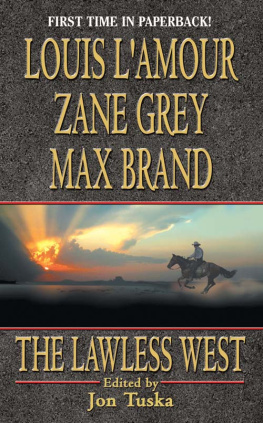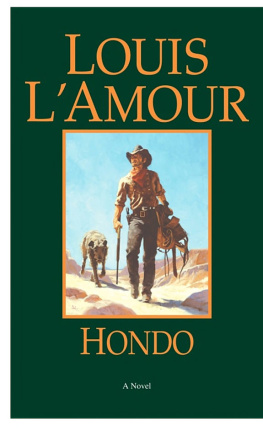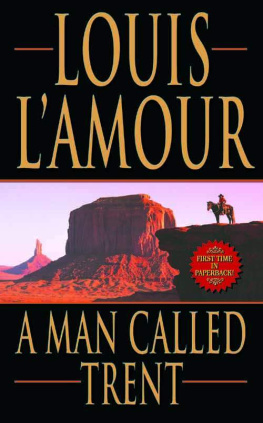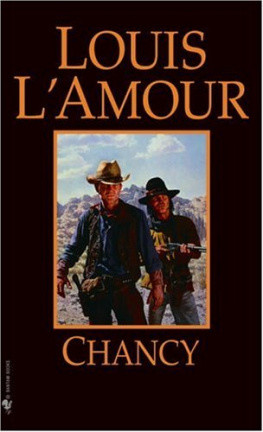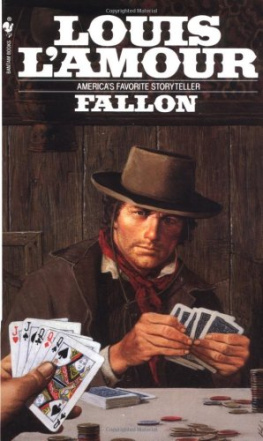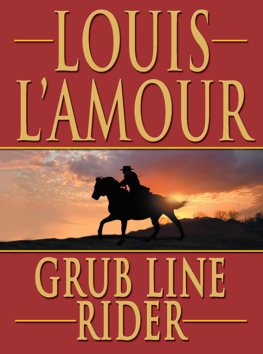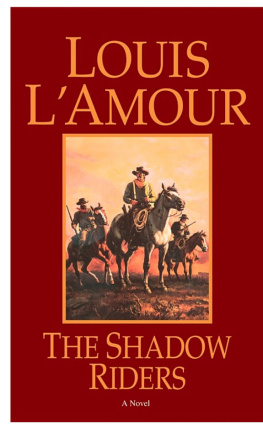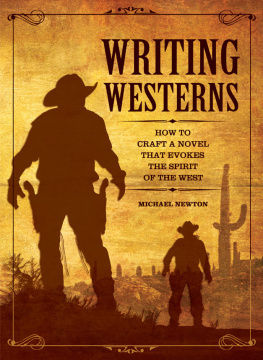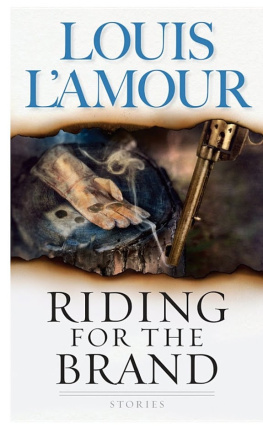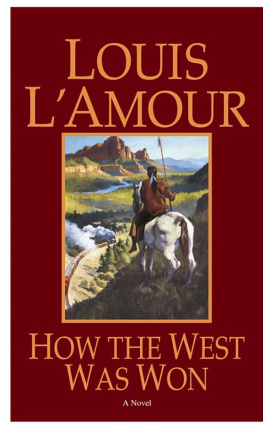
You move fast. Pinder was staring at me with small eyes. Suppose I had cut myself in with Blacky and the Pache?
My chuckle angered him. You? I had that pegged, Jim Pinder. When my guns came out, you would have died first. Youre faster than either of those two, so youd take yours first. Then Blacky, and after himI nodded toward the Apachehim. He would be the hardest to kill.
Pinder didnt like it, and he didnt like me. I made an offer, he said.
And you brought these coyotes to give me a rough time if I didnt take it? Be damned to you, Pinder! You can take your CP outfit and go to blazes!
His lips thinned down and he stared at me. Ive seldom seen such hatred in a mans eyes. Then get out! he said. Get out fast! Join Maclaren an you die!
Then why wait? Im not joining Maclaren so far as I know now, but Im staying, Pinder. Any time you want what Ive got, come shooting. Ill be ready.
from Riders of the Dawn by Louis LAmour
A short novel is a story too short to be a novel40,000 words or lessand too long to be a short story. It was a literary form that once was encouraged and flourished when there were numerous fiction magazines published weekly, monthly, or quarterly in the United States, and it is a form at which numerous American writers excelled. Although a great many authors have written excellent Western fiction, beginning with Mark Twain and Bret Harte, only three managed as a result of their Western stories to attract a sufficient readership to become wealthy. Zane Grey, Max Brand, and Louis LAmour were the three, and their work has endured with generations of readers throughout the world. For this collection I have selected a short novel by each of these authors, consisting of stories I regard as among their best work. This is the third, and last, time I shall do so. Earlier collections of short novels by these three authors have been titled The Golden West and The Untamed West respectively for first publication in paperback.
The greatest lesson the pioneers learned from the Indians is with us still: that it is each mans and each womans inalienable right to find his own path in life, to follow his own vision, to achieve his own destinyeven should one fail in the process. There is no principle so singularly revolutionary as this one in human intellectual history before the American frontier experience, and it grew from the very soil of this land and the peoples who came to live on it. It is this principle that has always been the very cornerstone of the Western story. Perhaps for this reason critics have been wont to dismiss it as subversive and inconsequential because this principle reduces their voices to only a few among many. Surely it is why the Western story has been consistently banned by totalitarian governments and is sneered at by the purveyors of political correctness. Such a principle undermines the very foundations of totalitarianism and collectivism because it cannot be accommodated by the political correctness of those who would seek to exert power over others and replace all options with a single, all-encompassing, monolithic pattern for living.
There is no other kind of American literary endeavor that has so repeatedly posed the eternal questionshow do I wish to live?, in what do I believe?, what do I want from life?, what have I to give to life?as has the Western story. There is no other kind of literary enterprise since Greek drama that has so invariably posed ethical and moral questions about life as a fundamental of its narrative structure, that has taken a stand and said: this is wrong; this is right. Individual authors, as individual filmmakers, may present us with notions with which we do not agree, but in so doing they have made us think again about things that the herd has always been only too anxious to view as settled and outside the realm of questioning.
The West of the Western story is a region where generations of people from every continent on earth and for ages immeasurable have sought a second chance for a better life. The people forged by the clash of cultures in the American West produced a kind of human being very different from any the world had ever known before. How else could it be for a nation emerging from so many nations? And so stories set in the American West have never lost that sense of hope. It wasnt the graves at Shiloh, the white crosses at Verdun, the vacant beaches at Normandy, or the lines on the faces of their great men and women that made the Americans a great people. It was something more intangible than that. It was their great willingness of the heart.
What alone brings you back to a piece of music, a song, a painting, a poem, or a story is the mood that it creates in you when you have experienced it. The mood you experience in reading a Western story is that a better life is possible if we have the grit to endure the ordeal of attaining it, that it requires courage to hope, the very greatest courage any human being can ever have. And it is hope that distinguishes the Western story from every other kind of fiction. Only when courage and hope are gone will these stories cease to be relevant to all of us.
Jon Tuska
Portland, Oregon
ZANE GREY
Zane Grey (1872-1939) was born Pearl Zane Gray in Zanesville, Ohio. He was graduated from the University of Pennsylvania in 1896 with a degree in dentistry. He conducted a practice in New York City from 1898 to 1904, meanwhile striving to make a living by writing. He met Lina Elise Roth in 1900 and always called her Dolly. In 1905 they were married. With Dollys help, Grey published his first novel himself, Betty Zane (Charles Francis Press, 1903), a story based on certain of his frontier ancestors. Eventually closing his dental office, Grey moved with Dolly into a cottage on the Delaware River, near Lackawaxen, Pennsylvania. It is now a national landmark.
Although it took most of her savings, it was Dolly Grey who insisted that her husband take his first trip to Arizona in 1907 with C. J. Buffalo Jones, a retired buffalo hunter who had come up with a scheme for crossing the remaining bison population with cattle. Actually Grey could not have been more fortunate in his choice of a mate. Dolly Grey assisted him in every way he desired and yet left him alone when he demanded solitude; trained in Englishat Hunter College, she proof-read every manuscript he wrote and polished his prose; she managed all financial affairs and permitted Grey, once he began earning a good income, to indulge himself at will in his favorite occupations, hunting, fishing, sailing, and exploring the Western regions.
After his return from that first trip to the West, Grey wrote a memoir of his experiences titled The Last of the Plainsmen (Outing, 1908) and followed it with his first Western romance, The Heritage of the Desert (Harper, 1910). It remains one of his finest novels. The profound effect that the desert had had on him was vibrantly captured so that, after all of these years, it still comes alive for a reader. In a way, too, it established the basic pattern Grey would use in much of his subsequent Western fiction. The hero, Jack Hare, is an Easterner who comes West because he is suffering from tuberculosis. He is rejuvenated by the arid land. The heroine is Mescal, desired by all men but pledged by the Mormon church to a man unworthy of her. Mescal and Jack fall in love, and this causes her to flee from Snap Naab, for whom she would be a second wife. Snap turns to drink, as will many another man rejected by heroines in other Grey romances, and finally kidnaps Mescal. The most memorable characters in this novel, however, are August Naab, the Mormon patriarch who takes Hare in at his ranch, and Eschtah, Mescals grandfather, a Navajo chieftain of great dignity and no less admirable than Naab. The principal villaina type not too frequently encountered in Greys Western storiesis Holderness, a Gentile and the embodiment of the Yankee business spirit that will stop at nothing to exploit the land and its inhabitants for his own profit. Almost a century later, he is still a familiar figure in the American West, with numerous bureaucratic counterparts in various federal agencies. In the end Holderness is killed by Hare, but then Hare is also capable of pardoning a man who has done wrong if there is a chance for his reclamation, a theme Grey shared with Max Brand.

